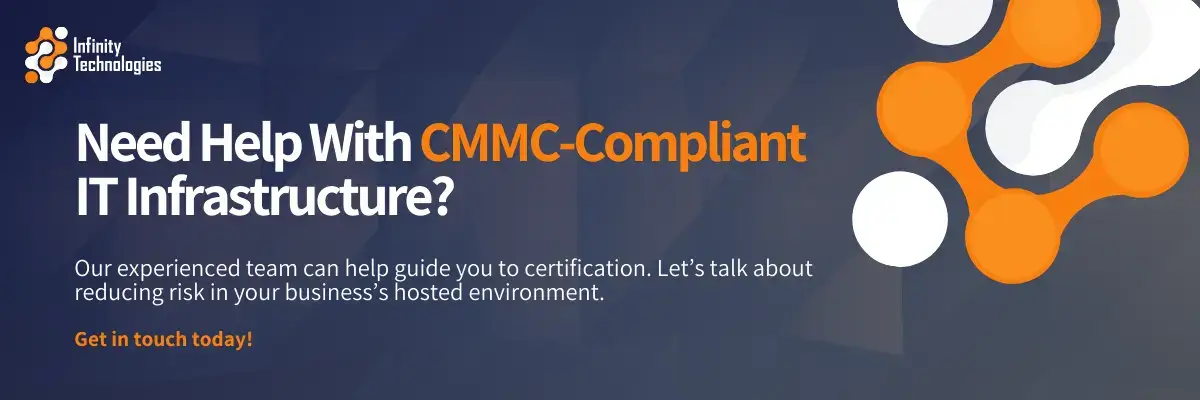If you’re a government contractor or subcontractor handling Controlled Unclassified Information (CUI) and Federal Contract Information (FCI), you’ll be well aware that for many, achieving Cybersecurity Maturity Model Certification (CMMC) Level 2 is no longer optional.
While we’ve explored various aspects of CMMC in previous articles, this is our first deep dive into a specific component of your IT infrastructure that significantly impacts compliance. Today, we’re talking about hosted environments and their unique security implications that could end up impacting CMMC certification for Fredericksburg businesses like yours.
What Is a Hosted Environment?
A hosted environment involves physical servers that are managed and maintained off-premises by your provider. Rather than housing servers in your facility, you leverage external infrastructure with varying levels of control and responsibility. These environments come in several forms:
- Public Cloud: Shared infrastructure managed entirely by providers like AWS, Azure, or Google Cloud
- Private Cloud: Dedicated infrastructure for your organization only
- Hybrid Cloud: Combination of public cloud services with on-premises infrastructure
- Managed Hosting: Dedicated hardware fully managed by a hosting provider
Understanding these distinctions is important, as the impact of hosted environments on CMMC compliance varies significantly across models.
How Your Hosted Environment Impacts CMMC Compliance
Your chosen infrastructure directly affects your path to certification in several key ways, including:
- Responsibility Boundaries
Different hosting models create varying responsibility models. In public clouds, the provider handles physical security and infrastructure, while you maintain responsibility for data protection and access controls.
This shared responsibility can create compliance gaps if not properly understood.
- Documentation Requirements
Hosted environments often require additional documentation to demonstrate CMMC compliance. You must clearly define security control ownership between your organization and providers through System Security Plans (SSPs) and Plan of Action & Milestones (POA&Ms).
- Access Control Complexity
Off-premises hosting introduces additional access points that must be secured. Remote administration, third-party support personnel, and data transmission between environments all create potential vulnerabilities that your compliance strategy needs to address.
- Incident Response Capabilities
Your ability to detect, respond to, and recover from security incidents depends, in part, on your hosting arrangement. Public cloud solutions may limit visibility into underlying infrastructure, while private clouds offer greater control but require more internal expertise.
The specific impact your organization’s hosted environment could have on your CMMC compliance journey is probably best understood by reaching out to IT support in Frederickson. The professionals can draw on extensive experience translating theoretical requirements into practical measures for your business. That being said, we can offer some general guidance on best practices for each type of hosted environment here.
Best Practices for Public Cloud Environments
Public cloud adoption continues to grow, but these environments require careful configuring to maintain compliance:
- Implement robust encryption for all CUI data both in transit and at rest, leveraging provider-specific tools configured to CMMC requirements.
- Utilize dedicated compliance frameworks offered by major providers (e.g., AWS GovCloud, Azure Government) designed specifically for government-related workloads.
- Ensure comprehensive identity management with multi-factor authentication (MFA) for all users accessing sensitive information.
- Enable detailed logging and monitoring across all cloud services, with centralized collection for analysis against potential threats.
- Maintain clear documentation of the shared responsibility model, including provider attestations and your implemented controls.
Best Practices for Private Cloud Environments
Private clouds offer greater control but require more rigorous management:
- Conduct regular vulnerability assessments specifically tailored to your infrastructure configuration and patching schedule.
- Implement network segmentation to isolate CUI data from other business operations, creating security boundaries that limit potential exposure.
- Develop comprehensive disaster recovery plans that address both data protection and service continuity in alignment with CMMC requirements.
- Establish rigorous change management processes to maintain compliance as environments evolve, ensuring security isn’t compromised during updates.
- Perform regular security training for all personnel with access to hosted environments handling sensitive information. As highlighted in Techital’s piece on cybersecurity best practices, human error remains a primary attack vector, making education essential for maintaining compliance.
Best Practices for Hybrid Environments
Hybrid environments present unique challenges that require integrated approaches:
- Create consistent security policies that apply across both on-premises and cloud components to prevent security gaps at integration points.
- Implement unified access controls for identity management across all environment components to prevent credential-based attacks.
- Establish end-to-end encryption for data moving between environments, ensuring protection throughout the entire data lifecycle.
- Deploy comprehensive monitoring solutions that provide visibility across all infrastructure components, both cloud and on-premises.
- Develop clear data classification guidelines to ensure appropriate handling of information based on sensitivity, particularly for CUI data.
If you’re pursuing CMMC certification for your Fredericksburg business, hybrid environments often represent the most practical approach to balancing operational needs with compliance requirements.
Best Practices for Managed Hosting
Managed hosting solutions require careful vendor management:
- Perform a thorough provider assessment before selection, verifying their understanding of and compliance with NIST 800-171 and CMMC requirements.
- Establish clear contractual terms regarding security responsibilities, incident reporting, and compliance maintenance.
- Implement regular compliance validation through third-party assessments rather than relying solely on provider attestations.
- Maintain independent backup solutions for critical data to prevent vendor lock-in and ensure recoverability.
- Develop comprehensive exit strategies to ensure continuity of compliance if provider relationships change.
When taking this approach, it’s a good idea to team up with local IT support in Fredericksburg to help manage relationships with hosting providers while maintaining compliance standards.
Take Your CMMC Compliance Journey Step by Step
As you continue your CMMC compliance journey, remember that certification isn’t an exercise in checking boxes. It’s about developing a comprehensive security posture that protects sensitive government information across your entire infrastructure, and that takes time.
Getting your hosted environments aligned with CMMC requirements is one piece of the puzzle. With the right approach and a reliable team to guide you, your business can achieve compliance while maintaining operational efficiency and effectiveness.
Infinity Technologies: North Virginia’s Premier Managed IT, Cybersecurity, and IT Support Partners
At Infinity Technologies, we specialize in providing IT and cybersecurity solutions that cover all bases—from support and ongoing assessments to threat management, response, and recovery—to SMBs in Charlottesville, VA, and beyond. Our managed services are designed to keep your business safe, secure, and operational, no matter the cyber threats you face.
Curious to see the difference that we can make for your SMB? Contact us today to learn how our IT support and cybersecurity solutions can provide the robust protection your business deserves.



